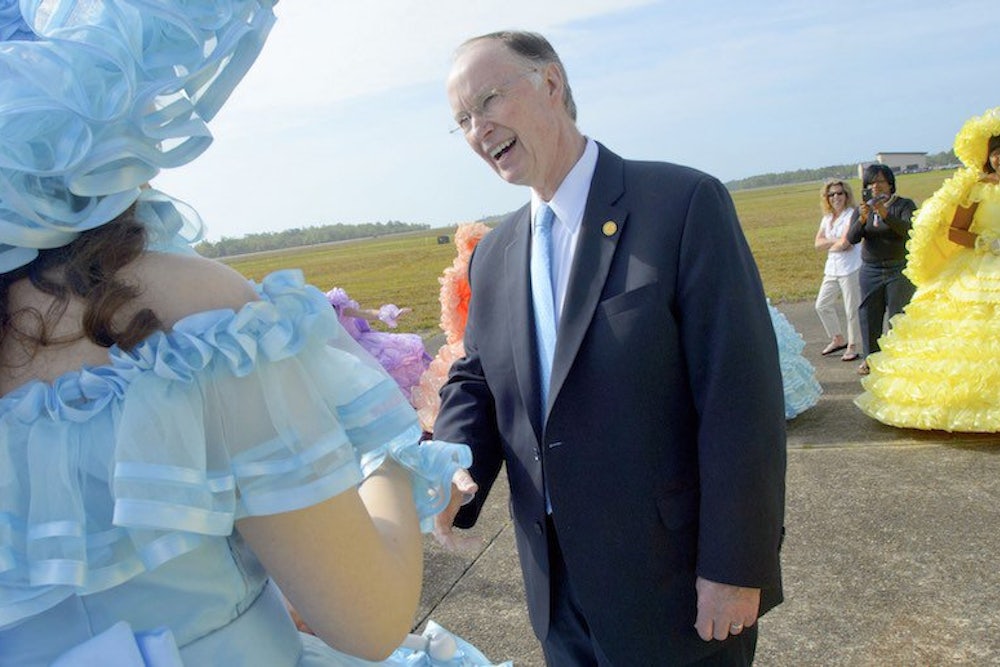Same-sex couples across Alabama began marrying this morning, after the Supreme Court refused to put on hold a ruling by a federal judge invalidating the state’s ban on same-sex marriage. The high court’s move makes Alabama the 37th state where gay unions are legal.
But Roy Moore, the state’s chief justice, won’t go down without a fight. A handful of probate judges in the state are abiding by a last-ditch letter Moore fired off Sunday night ordering them to follow state law and deny marriage licenses to same-sex couples. The Southern Poverty Law Center, which last month filed an ethics complaint against Moore for his defiance of the federal court order, noted at least one court is heeding Moore’s directive as if it carried the force of law:
Couple in Tuscaloosa County denied license, handed copy of Roy Moore's order instead. #ALMarriage
— SPLC (@splcenter) February 9, 2015But Alabama Attorney General Luther Strange, who led Governor Robert Bentley’s bid to the Supreme Court to put a temporary hold on gay weddings, said in a statement he regretted the justices’ decision not to intervene, and said he expected “more confusion” in the months leading up to a final pronouncement on the constitutionality of same-sex marriage. In contrast to Moore, Strange recognized that U.S. District Judge Callie Granade’s order striking down the Alabama ban effectively prevented him from enforcing it. And perhaps sensing the probate judges were setting a dangerous precedent in standing with Moore, Strange counseled them “to talk to their attorneys.”
It’s not immediately clear what fallout lies ahead for Moore, but Granade left the door open in one of her rulings to allow same-sex couples who are denied licenses by noncompliant probate judges to intervene in federal court. Christine Hernandez, the attorney representing Cari Searcy, one of the plaintiffs challenging the Alabama ban, filed a motion in federal court seeking to hold Don Davis, a judge in Mobile County Probate Court, in contempt for not opening the marriage licensing division of his courthouse. Moore, for his part, appeared to warn judges under his watch that not following his order could lead the state to impose sanctions on them.
Meanwhile, at the U.S. Supreme Court, Associate Justice Clarence Thomas—who oversees emergency requests from Alabama—strongly dissented from his colleagues’ refusal to stop same-sex weddings in the state. Joined by Justice Antonin Scalia, Thomas took issue with the court’s seeming inconsistency in choosing which same-sex marriage requests to put on hold, pointing out that the court had already done so twice in cases presenting similar circumstances. “Those decisions reflected the appropriate respect we owe to States as sovereigns and to the people of those States who approved those laws,” he wrote.
But Thomas went a step further. Noting the importance of preserving “the status quo” in a state otherwise unaffected by United States v. Windsor—which in 2013 voided the federal Defense of Marriage Act—the justice wrote that the court’s failure to intervene in Alabama portends how it may rule on the issue of same-sex marriage: “This acquiescence may well be seen as a signal of the Court’s intended resolution of that question.” Thomas closed his opinion by blasting the court’s “increasingly cavalier attitude toward the States,” and added he “would have shown the people of Alabama the respect they deserve” until the court rules definitively on whether the Constitution compels states to recognize same-sex marriages.
In a statement Monday, Governor Bentley sided with that dissenting opinion and declared that he won't take action against probate judges who refuse to issue marriage licenses. "We will follow the rule of law in Alabama, and allow the issue of same sex marriage to be worked out through the proper legal channels," he said.
Today’s flurry of activity is a harbinger of Obergefell v. Hodges, the case the Supreme Court will be deciding come June. For one, it’s indicative of the tension that still exists between a recognition of same-sex marriage under the Constitution’s promise of due process and equal protection of the laws, and the states’ sovereignty to order their own affairs with respect to marriage and family laws. Without a clear ruling on whether these two interests can be reconciled—or if one necessarily must give way to the other—the chaos Moore has wrought in Alabama is only the beginning. Because even if the Supreme Court rules same-sex couples have a right to marry, who’s to say the states don’t have a right to step up the culture wars in other ways? A jurisprudence of doubt is all you need for more problems down the road.
